I have a minor stomach bug and didn’t feel well enough to run on this beautiful day, so I went for a walk instead during lunchtime. I went down to the Roosevelt Memorial. It is a pretty big and impressive thing, as you can see in the picture, and there is a lot of flowing water.
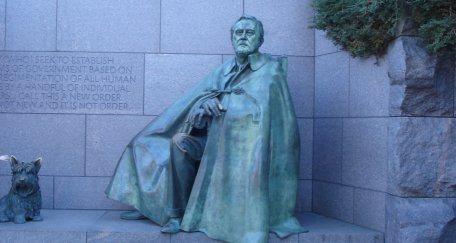
This size and complexity of the memorial goes against Roosevelt ’s wishes. He told Felix Frankfurter that he wanted a memorial no bigger than his desk and there is a memorial about the size of a desk near the National Archives. But the Roosevelt legacy outgrew the man.

All monuments are really as much about the time when they are constructed as about the people or events depicted. You can see the 1990s (when the Memorial was built) in the Memorial itself. For example, although Roosevelt was crippled with polio, he didn’t allow himself to be pictured in a wheelchair. I think there is only one such photo. Many people at the time were not aware of the extent of his infirmity. By the 1990s, such attitudes were unpopular. The compromise, in my picture, shows him seated with his cape covering the wheelchair. This evidently offended some people, so there is also a statue of Roosevelt in his wheelchair.
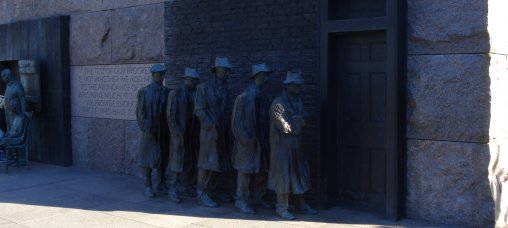
I think we have an interesting question. Roosevelt expressed clearly in his words and actions that he would not have approved of the monument or of his depiction in the wheelchair. The question is, at what point does a man’s legacy become more important than he is and how much license should we have to fit a man of the past into contemporary morals and sensibilities?

In pictures from the times, Roosevelt is always shown with a cigarette. It was a big part of his personality. We won’t see that. This part of his image is gone. There was a controversy about a stamp featuring the artist Jackson Pollock, who evidently smoked all the time. The postal service made the stamp from a photo of Pollock. They airbrushed out the characteristic cigarette.

Modern technology makes this kind of ex-post-facto censorship much easier. I think it is better to leave such things in and explain that times were different. We cannot apply today’s standards to the people of the past.
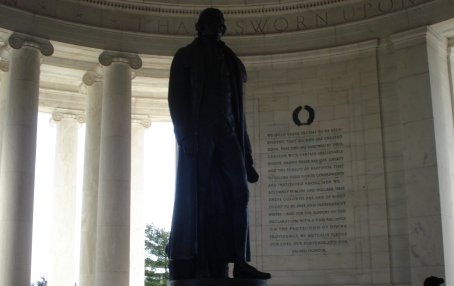
This applies to Thomas Jefferson more than most. I also went to his memorial. Jefferson was knocked off his high pedestal by his slave owning. It is true that slavery was a terrible blight, but it had been around as long as human society. The pyramids were built with slave labor. Jefferson had the misfortune to be on the societal cusp that separated the 5000 years of human history when slavery was accepted from the last couple centuries when it was anathema to civilized people. It wasn’t until around the time of Jefferson that large numbers of people began to see slavery as an evil to be extirpated and that outrage was limited generally to the Western world at that time. There are still parts of Africa and Asia where forms of slavery are practiced.
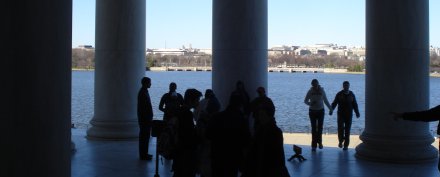
It is hard not to judge Jefferson by today’s standards and harder still to understand how someone who could think so elegantly about freedom could have such a blind spot about the freedom of people he saw every day. But we really cannot judge him too harshly for not making a clean break with a tradition that stretched back to the dawn of history.
BTW – I met a former slave when I was in Poland . He and his family were captured by the Soviets in 1939 and sent to labor camps where only those who worked got food rations. The Soviets, enlightened as they were, would not officially allow children to work, so this guy’s underage brothers and sisters were not allowed to work and got no food. It was the perfectly logical workings of a diabolical bureaucracy. The family tried to share, but they all died except for the man I met. He survived the Russian death camps and returned to Poland where he became a wood worker and was making decorations for churches in Zakopane. He was a surprisingly cheerful man, with a still abiding faith in the goodness of God despite his ordeal, and not bitter at all against the Russians. “It was a different time and place,” he advised me. This is the only actual slave I ever met. In America , after nearly 150 years, there is no living memory of slavery. My friend’s conditions were much worse than those in Virginia during Jefferson ’s time. Perhaps we should take his advice.
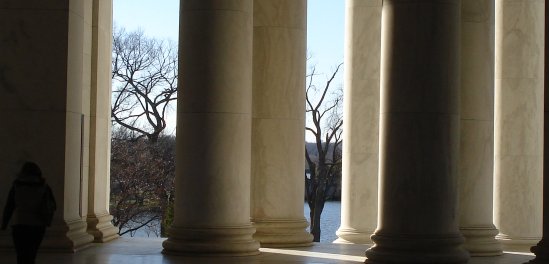
Jefferson was a great man, although a flawed human being – like all of us. The genius of America is that we can take humans as they are, w/o demanding perfection, and through all these imperfect people create a more perfect country.
